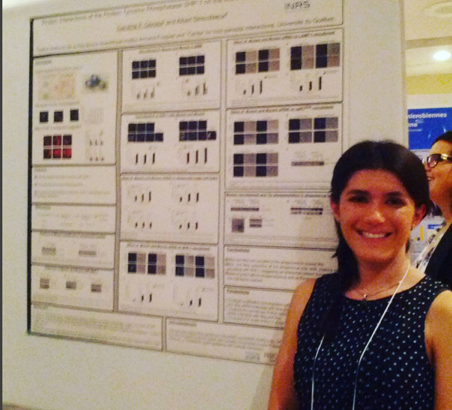Catherine Lau, Biology & Life Sciences co-editor
The journey through academia can be a tough one, but writing about it can help. Just ask our featured blogger Carolina Gomez, a PhD candidate at the Institut national de la recherche scientifique (Laval, QC) and the creator of ‘Middle PhD Crisis’.
When she’s not investigating protein interactions in macrophages (a type of white blood cell) or editing her thesis, Carolina is writing about science and giving advice to those who dare take on the academic pursuit. “It started with tiny pieces of things I wish I could have known when I was starting my path in academia,” she tells me. These include topics such as things to consider for oral presentations or the importance of work-life balance. But when her friends, family and readers turned to her for answers on health related questions, the topics expanded to encompass general science (e.g. What is an autoimmune disease?) as well as what she is up to in the lab.

Just another day in the lab for Carolina as she gets fully suited for an RNA extraction.
While she is enthusiastic about her own research, she is cautious about what she writes since her results have not yet been published in an academic journal. “What you would find on the blog about my project are very broad ideas, like the type of cells I work with or the type of techniques I use,” says Carolina. Along with her posts on topics like what to include in your lab notebook are pieces that resonate most with us at Science Borealis: the importance of science communication.
In Carolina’s view, good communication, like many skills in life, can be learned and worked on. She suggests that there should be a stronger emphasis on science communication in graduate school. Furthermore, she thinks that graduate students with an interest in science communication should look for ways to get involved in their local communities. She cites her own experience to illustrate her point: “… in Quebec, there’s the Association for Science Communicators and through that network you can find opportunities.” Her own networking skills and obvious drive to find work in science communication have led her to her current job as a medical writer.
“…you have to find a middle way, where you keep the strength of the science but also make it accessible.”
Finding such opportunities can help graduate students improve how they communicate with different target audiences. In Carolina’s eyes, science communication “…is not just [about] going to a conference and talking to the 50 people who know your subject so well that you don’t need to explain everything.” Without undermining the importance of traditional academic communication via journal publications or conference presentations, she points out that to connect with the general public “you have to find a middle way, where you keep the strength of the science but also make it accessible.” Academics may feel the need to cut out information when presenting to the public, but it is important to realize that the general audience is curious and eager to learn. So, it’s up to scientists to package the information in a way that ensures it is engaging.

Carolina spending some time at the Leiden’s Science Center.
Questions on what to expect when doing a PhD or studying abroad (Carolina is from Columbia) are just a couple of the topics Carolina addresses in her latest posts. She was inspired to write these posts when her cousin asked for advice on pursuing a research career. These pieces are particularly meaningful as her cousin stands in the shoes she once stood in nearly a decade ago. Carolina enjoyed writing them and says, “…it was very personal; it made me realize how your vision can change so much through your path in academia.” An important lesson she has learned is to have patience and to persevere despite the challenges because any endeavour takes time to bear fruit.
Now, after successfully navigating through her own “middle PhD crisis” and nearing the end of her degree, Carolina is looking to expand her skills in science communication and is considering careers in museums or science centres. However, she wants to continue her blog to keep the science conversation going and to make sure she always has a platform for her thoughts.
For some valuable insight on academia and science communication, be sure to check out Carolina’s blog ‘Middle PhD Crisis’.
*Header image: One of the last poster presentations for Carolina during graduate school.
** All images provided by Carolina Gomez




